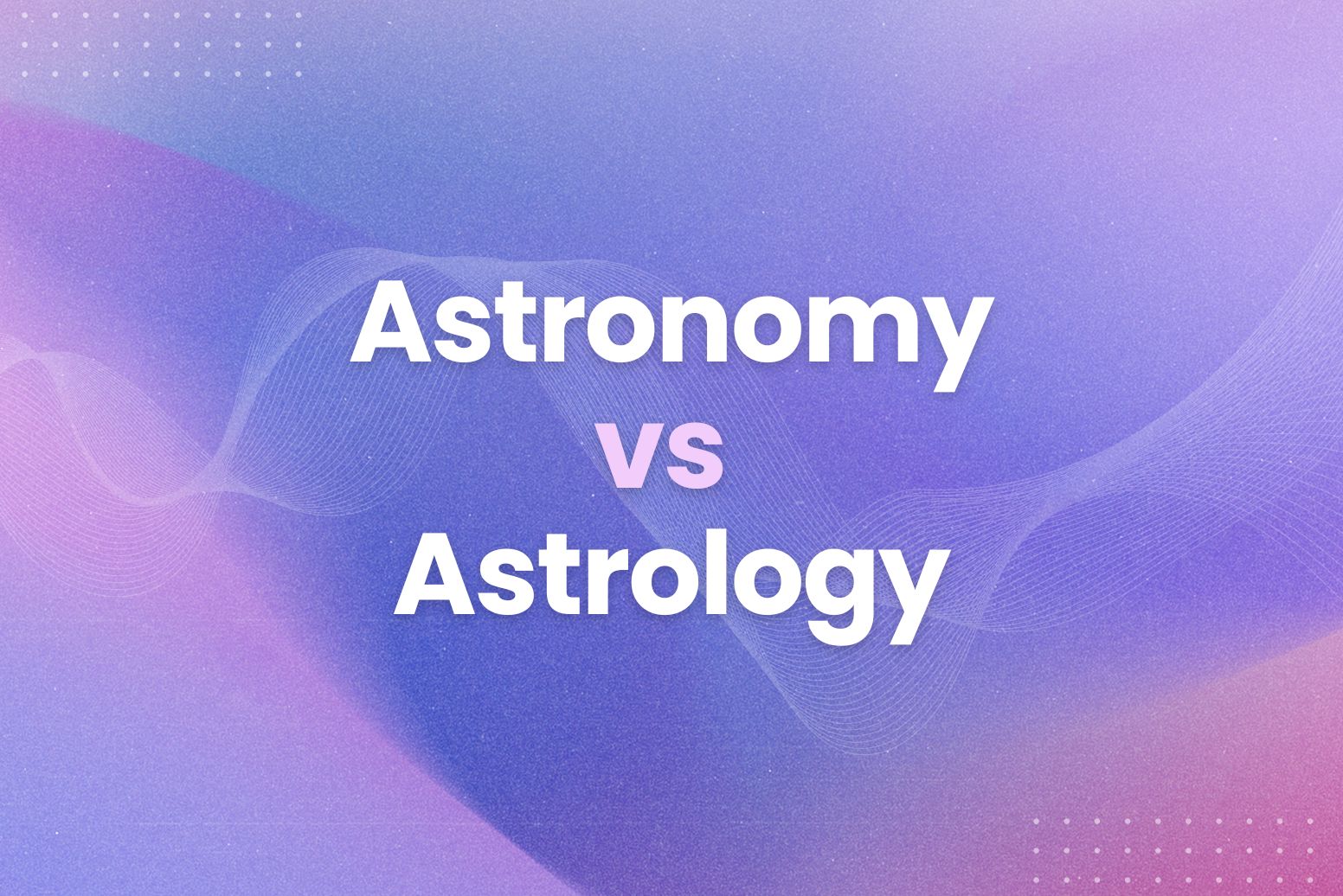Have you ever looked up at the night sky and wondered how the stars impact our lives—or if they even do? The lines between astronomy vs astrology can feel blurry at first, especially since both are rooted in humanity’s fascination with the cosmos. But while astronomy is all about scientific exploration, astrology leans into symbolism and personal connection.
Definition of Astronomy
Astronomy is the scientific study of celestial objects, space, and the physical universe as a whole. Astronomy dives into the mysteries of the universe, from the fiery birth of stars to the vast, quiet stretches of space. It’s the science that studies what’s out there—planets, galaxies, even those epic black holes you see in documentaries. It explores phenomena beyond Earth’s atmosphere, including stars, planets, galaxies, black holes, and cosmic events, through observation, mathematics, and physics to understand how the universe works.
Unlike the myths about constellations we’ve all heard, astronomy is grounded in facts, aiming to understand how it all works together, from the tiniest particle to the grand expanse of the universe.
Examples of Astronomy
- When you use an app like SkySafari or Star Walk to point at the night sky and identify constellations, you’re engaging with astronomy. Spotting Orion’s Belt or the North Star during a camping trip isn’t just for fun—it’s a way ancient sailors navigated the seas before GPS existed.
- Think back to 2017’s “Great American Eclipse,” when millions across the U.S. stopped what they were doing to witness day turning into night for a few moments. Without astronomy’s precise calculations, we wouldn’t know when or where these awe-inspiring events will occur—or how to safely view them with eclipse glasses.
- The Hubble Space Telescope’s breathtaking images, like the Pillars of Creation or the farthest galaxy clusters, have made their way onto calendars, screen savers, and even fashion designs. These snapshots aren’t just pretty—they’re key to understanding how stars and galaxies form and evolve over billions of years.
- Have you ever wondered why summer in Australia happens when it’s winter in the U.S.? Astronomy explains it: Earth’s tilt and orbit around the sun create seasons. Farmers, event planners, and even the creators of your weather app rely on this understanding to predict conditions year-round.
Definition of Astrology
Astrology is the practice of finding connections between celestial movements and human experiences.
It suggests that the alignment of planets and stars at the time of your birth influences your personality, choices, and even your destiny. For instance, being a “Libra” or “Scorpio” comes from this idea, tying your traits to the zodiac. While it’s not backed by science, astrology has been part of cultures worldwide, from ancient Babylon to today’s Co-Star app notifications.
Examples of Astrology
- Remember that one time your texts wouldn’t send, your laptop crashed mid-meeting, and your travel plans got derailed? You might’ve heard someone say, “Mercury is in retrograde!” It’s become a pop-culture punchline, but astrology links this phenomenon to communication breakdowns and tech glitches. Even brands like Starbucks and Sephora have playfully referenced it in marketing campaigns.
- In 2024, the Year of the Dragon in Chinese astrology is associated with power, luck, and ambition. Families in China and beyond often consider dragon years especially fortunate for having children, believing it sets them up for a life of success. These beliefs shape cultural milestones, influencing decisions from weddings to business launches.
- From Co-Star notifications to viral TikToks saying, “Signs as types of friends at brunch,” astrology has cemented itself in online culture. Apps like Sanctuary or memes like “Geminis be like…” make it easy to dive into your star chart or laugh at zodiac stereotypes, bringing this ancient practice into the digital age.
- At local flea markets or boho festivals, you’ll often see booths offering star chart readings or selling zodiac-themed jewelry. Whether it’s a necklace with your constellation or a mug printed with “Capricorn energy,” astrology shapes how people express themselves through items they love.
Is your writing feeling Mercury retrograde messy? Arvin AI’s Grammar Checker can realign it in seconds!
What are the Differences between Astronomy vs Astrology?
1. Science vs. Belief System: Astronomy vs Astrology
Astronomy stands firmly in the realm of science, driven by physics and observable data. For example, when teams at NASA calculate the exact speed needed for a Mars rover to land safely, they’re using astronomical principles.
In contrast, astrology is more interpretive, like when Beyoncé proudly identifies as a Virgo in interviews, using her zodiac sign to reflect traits like perfectionism and ambition.
The key difference? Astronomy seeks to uncover universal truths, while astrology offers personal interpretations.
2. Evidence-Based vs. Symbolic: Astronomy vs Astrology
Imagine watching a documentary like Cosmos by Neil deGrasse Tyson, where the origins of black holes are explained through equations and experiments. That’s astronomy.
Now, picture opening the Co-Star app to see a notification like, “Today’s energy suggests you reconnect with old friends”—that’s astrology, using celestial movements as symbols for guidance.
While astronomy thrives on measurable evidence, astrology turns planetary alignments into a poetic language of meaning.
Your zodiac sign can’t predict perfect grammar, but Arvin AI can make it happen.
3. Tools and Methods
Astronomers rely on high-tech tools like the James Webb Space Telescope, which captures breathtaking images of galaxies forming billions of years ago.
Meanwhile, astrologers turn to natal charts and zodiac wheels, like those you’d find in a trendy Etsy shop selling star sign posters. While the methods differ, both are fueled by humanity’s fascination with the heavens.
4. Purpose and Impact
The goal of astronomy is universal: to decode the mysteries of the cosmos. Think about how understanding the Earth’s orbit led to innovations like GPS.
Astrology, on the other hand, is deeply personal, helping individuals feel more connected to the universe. It’s like reading your horoscope in a glossy magazine—not a scientific breakthrough, but a moment of introspection.
5. Modern Pop Culture Context
Astronomy often features in big-budget movies like Interstellar, showcasing black holes and time dilation as scientific phenomena. Astrology, however, lives in our day-to-day lives, from zodiac memes on Instagram to personalized readings on apps like Sanctuary. Both continue to capture our imagination, but in very different ways.
6. Shared Roots, Divergent Paths
Back in ancient Babylon, astrology and astronomy were one and the same, as stargazers sought to predict seasonal changes and divine cosmic meaning. Over centuries, they split, with astronomy evolving into a science and astrology into a cultural and spiritual practice. Today, one helps us navigate space, and the other helps us navigate our feelings.
| Aspect | Astronomy | Astrology |
| What it is | Science that studies space and celestial objects. | Belief system that links stars and planets to life. |
| Focus | What’s out there and how it works. | How cosmic movements influence people’s lives. |
| Tools | Telescopes, satellites, and scientific data. | Zodiac signs, birth charts, and planetary alignments. |
| Examples | Mapping a galaxy or studying black holes. | Reading your horoscope or talking about your zodiac sign. |
| Key Difference | It’s based on science and evidence. | It’s based on interpretation and tradition. |
Common Grammar Mistakes for Astronomy vs Astrology
1. Using the Wrong Term in Context
It’s surprisingly easy to mix up Astronomy vs Astrology, especially because they sound similar. For instance:
- Incorrect: I love reading about astrology in my science textbook.
(If it’s about stars and galaxies, the correct word is “astronomy.”) - Correct: I love reading about astronomy in my science textbook.
Tip: If it involves telescopes, scientific data, or space missions like the James Webb Space Telescope, “astronomy” is your go-to word. Use “astrology” for horoscopes, zodiac signs, or Mercury retrograde memes.
2. Confusing Adjective Forms
Both words have related adjectives, but Astronomy vs Astrology are often used incorrectly:
- Incorrect: Her favorite hobby is studying astrological constellations.
- Correct: Her favorite hobby is studying astronomical constellations.
Why? “Astronomical” relates to astronomy (scientific), while “astrological” relates to astrology (symbolic). A quick check: If it’s about horoscopes, use “astrological”; if it’s about stars, use “astronomical.”
3. Mispronunciation Leading to Misunderstanding
Mispronouncing these words can lead to writing errors:
- Astronomy is pronounced as uh-STRON-uh-mee (emphasizing the “stron” for science).
- Astrology is pronounced as uh-STROL-uh-jee (focusing on “strol” for horoscopes).
Imagine telling someone, “I’m into astronomy,” and they reply with, “Oh, what’s your zodiac sign?” To avoid this, enunciate clearly.
4. Misusing the Terms in Pop Culture References
Sometimes, people incorrectly label concepts from movies or literature:
- Incorrect: The movie Interstellar explores astrology on a cosmic scale.
(Interstellar is about space science, so the correct word is “astronomy.”) - Correct: The movie Interstellar explores astronomy on a cosmic scale.
Similarly, astrology would be better suited for something like Harry Potter, where Professor Trelawney talks about star charts.
5. Incorrect Plural Forms
Another mistake is treating these as countable nouns:
- Incorrect: The astrologies of different cultures are fascinating.
- Correct: Astrology varies greatly across cultures.
Tip: Both “astronomy” and “astrology” are uncountable nouns. Avoid pluralizing them and instead use phrases like “fields of study” or “practices.”
6. Overgeneralization in Everyday Speech
People often overuse one term for all celestial-related topics:
- Incorrect: The astrology of black holes is incredible.
- Correct: The astronomy of black holes is incredible.
If it’s about cosmic phenomena, like black holes or nebulae, astronomy is the right word. Astrology works when discussing zodiac charts or planetary influences.
7. Spelling Errors
The subtle difference in spelling often trips people up:
- “Astronomy” has “nomy,” tying to knowledge and law (scientific systems).
- “Astrology” has “logy,” meaning the study of (interpretive frameworks).
Write with clarity that’s out of this world—Arvin AI’s Grammar Checker is your guide to stellar sentences.
Are Zodiac Signs Astronomy or Astrology?
Zodiac signs? That’s 100% astrology, not astronomy. When someone says, “I’m a Sagittarius, so I love adventure,” they’re diving into astrology, which connects celestial positions to personality traits and life events.
Astronomy, though, sees those same zodiac constellations differently—it maps and studies them as actual star formations in space. For instance, an astronomer might calculate the distance between stars in Virgo, but they won’t suggest it means you’re analytical.
What Comes First, Astrology or Astronomy?
Astrology came first, setting the stage for humanity’s fascination with the stars. Thousands of years ago, civilizations like the Babylonians gazed at the heavens and began connecting celestial patterns with life on Earth. For instance, they might have seen Venus shining brightly and taken it as a sign of good fortune or love. These observations formed the backbone of what we now call astrology, blending practical navigation with symbolic interpretation.
As time passed, this curiosity about the skies evolved. By the era of ancient Greece, thinkers like Ptolemy were working to chart the stars and planets with more precision, combining astrological ideas with mathematical tools. This gradual shift laid the foundation for astronomy. During the Renaissance, figures such as Copernicus and Galileo took things a step further, focusing on evidence-based methods. With telescopes in hand, they explored the universe’s mechanics, separating science from belief.
In essence, astrology sparked the journey, while astronomy transformed it into a scientific quest. The two share a common history, but their paths diverged as humanity moved from interpreting the stars’ meaning to understanding their reality.
What Is the Relationship Between Astrology and Astronomy?
Astrology and astronomy are deeply connected, sharing a history that stretches back thousands of years, yet their paths have diverged into very different fields today. Think of them as siblings who grew up together but chose completely different careers.
In ancient times, there was no separation between astrology and astronomy. Civilizations like the Babylonians and Egyptians observed the stars not just to track seasons or navigate but also to find meaning in celestial movements. They used the same constellations we know today, like Leo and Scorpio, as both symbolic tools for astrology and reference points for practical observations.
As humanity’s understanding of the cosmos expanded, these disciplines began to split. Astrology remained rooted in interpreting the stars and planets for personal guidance—like horoscopes and zodiac traits. On the other hand, astronomy developed into a science focused on the physical study of celestial objects, using telescopes and mathematics to explore phenomena like planetary orbits or black holes.
Today, the relationship between astrology and astronomy is more historical than practical. They both reflect humanity’s fascination with the skies, but while astrology connects people to cosmic meaning, astronomy explains the mechanics behind the beauty of the universe.
Differences Between Astronomy vs Astrophysics
1. Scope of Study
- Astronomy is the broader field that studies everything in space—stars, planets, galaxies, black holes, and even cosmic phenomena like supernovae. It focuses on observing and describing what’s out there. For example, an astronomer might catalog stars in a distant galaxy or track the movement of an asteroid.
- Astrophysics, on the other hand, zooms in on the physics driving those celestial objects and events. It seeks to understand how stars form, what powers a black hole, or why galaxies cluster the way they do. It’s about uncovering the why and how of the universe’s behavior.
2. Methods and Tools
- Astronomers primarily use observational tools like telescopes to collect data, whether it’s capturing light from a star or measuring the distance to a galaxy. For instance, the Hubble Space Telescope is a quintessential tool of astronomy, taking stunning images of the cosmos.
- Astrophysicists, meanwhile, rely on theories, simulations, and complex equations to interpret the data astronomers gather. They use tools like computer models to simulate the evolution of galaxies or analyze the physical properties of dark matter.
3. Historical Development
- Historically, astronomy dates back thousands of years when ancient civilizations mapped the stars for navigation or seasonal predictions. Over time, it became more scientific, with figures like Galileo and Copernicus transforming it into a structured study of space.
- Astrophysics, however, emerged later as physics advanced. Isaac Newton’s work on gravity laid the groundwork for understanding celestial mechanics, and the 20th century’s discoveries in relativity and quantum mechanics fueled its rapid growth.
4. Education and Career Paths
- Someone studying astronomy might focus on observational techniques, star classification, or even space exploration, often leading to roles at observatories or agencies like NASA.
- Astrophysics often leans heavily on theoretical work, with scientists delving into equations and models to study phenomena like dark energy or black hole singularities. These roles are often research-intensive, with collaborations at institutions like CERN or the Max Planck Institute.
| Aspect | Astronomy | Astrophysics |
| What it Does | Looks at the universe—stars, planets, galaxies—and describes what’s out there. | Dives into the science behind it all—figuring out how and why things in space work. |
| Focus | Observing and mapping space. | Explaining the physics of space, like how stars shine or why black holes exist. |
| Tools Used | Telescopes and satellites to capture data, like images of galaxies. | Equations, simulations, and models to understand what that data means. |
| Key Question | What’s out there? | How does it work? |
| Career Examples | Astronomer at an observatory or working on a space mission. | Researcher studying dark matter or creating computer models of galaxies. |
| Real-Life Example | Taking photos of a supernova. | Explaining the explosion’s energy and impact using physics. |
| Relationship | Observes the universe. | Explains the science behind what’s observed. |
Final Words
Understanding the difference between astronomy vs astrology is more than just a language lesson—it’s a way to appreciate how we’ve connected with the cosmos throughout history. Whether you’re decoding a birth chart or studying the physics of galaxies, the stars continue to inspire curiosity and wonder.

Ready to polish your writing and avoid mix-ups like these? Don’t let grammar errors eclipse your ideas. Use Arvin AI’s Grammar Checker to shine.
FAQ
Astronomy is the scientific study of the universe, focusing on celestial objects like stars and planets. On the other hand, astrology is a belief system that interprets how these celestial movements influence human life.
Many Islamic scholars consider astrology to conflict with Islamic teachings, as it attributes control to celestial bodies instead of God. However, using the stars for navigation or understanding the universe is encouraged.
Historically, astrology laid the groundwork for astronomy. Early stargazers studied celestial patterns for both spiritual and scientific purposes, but over time, astronomy became a science separate from astrology.
Astrology is not backed by scientific evidence. However, many people find personal meaning or guidance in its interpretations, which makes it significant to them culturally or spiritually.
Not exactly. Astrology is the broader study of how celestial movements are believed to affect life, while horoscopes are specific predictions or insights based on astrology.
A person who studies astronomy is called an astronomer. They often work in observatories, research institutions, or space agencies like NASA.
Astrology is the study of the positions and movements of celestial bodies, like planets and stars, and their supposed influence on human life and events.




